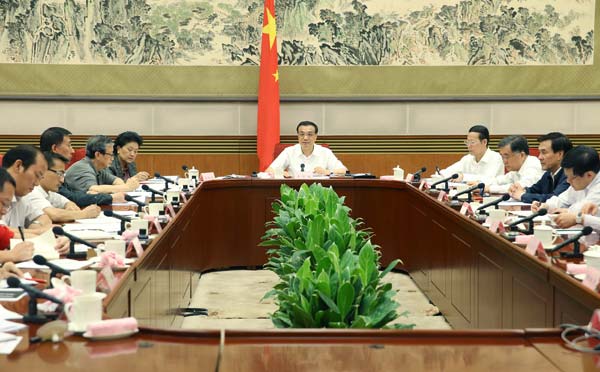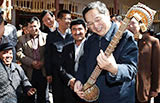The tell-it-all Premier
By Xu Oulu (Translated by chinadaily.com.cn) Updated: 2015-09-17 18:33
 |
|
Chinese Premier Li Keqiang (C) speaks during a meeting with economists and entrepreneurs in Beijing, capital of China, July 10, 2015.[Photo/Xinhua] |
Editor's note: This article was first published in Chinese by Xu Oulu in the biweekly Blog World on September 11, 2015.
In July 2014, one month after Premier Li Keqiang addressed the economic situation at the General Assembly of the Chinese Academy of Sciences and the Chinese Academy of Engineering, his speech made its way online and received over 300,000 hits in just one week.
It was the second TED-style lecture that Premier Li delivered in a year. In October 2013, he presented a report at the 16th National Congress of the All-China Federation of Trade Unions to nearly 2,000 grassroots representatives. The address, lasting 70 minutes and 20 seconds, was put online by CCTV, China's national TV station, entitled Chinese Economy Open Course by Premier Li.
Li Keqiang, the first Chinese premier with a doctorate in Economics, gave a course on China economics.
It is part of tradition for the Premier to address the economy at the General Assembly. Li used the term "tell-it-all" to describe such openness by the government. On both occasions, he shared the details of the Chinese economy with the whole world, including the intellectuals and the working class,, which is rare.
The general public used to have only indirect access to speeches by State leaders through the press. Now, for the first time ever, they were able to listen to the speeches directly on the Internet – in their original form, without any editing or retouching.
This video shares the space with Justice by Harvard University and Basics in Physics by Yale University on the same web page. "The premier addressing Chinese economy in open courses is in fact setting public agenda in the highest political form. This is a remarkable endeavor in information openness and political democracy," said Hu Baijing, government image specialist and journalism professor at Renmin University in China.
In both videos, which last a total of nearly 140 minutes, Li explains the reasons to ensure GDP, admits almost all the problems facing China's economy, and talks candidly about his government's plans. "Premier Li went unscripted from start to finish," said Wang Xixin, an expert on government openness and professor at School of Law, Peking University.
Such openness comes with some risks. His policies, words and even facial expressions are under intense scrutiny all across the world. Surprisingly, this did not elicit criticisms. "The Chinese mainland is at a crucial stage of reform. Therefore, the speech is of profound significance," Taiwan-based Want Daily reported.
"It is the open mindset of the premier to publicly discuss and explain his own idea of governance. Even though we face many problems, the leaders have remained confident," added Peking University's Wang Xixin.
The two open courses share similar topics as they both revolve around the current economic situation and future development strategies. "China's economy is running smoothly, but downward pressure is still immense," Premier Li said. The most direct manifestation is slowdown in GDP growth.
There have always been controversies clouding GDP. Especially at the juncture where there is no guarantee for rapid growth, many government officials believe that open discussions about GDP are just referring to failure itself.
However, Premier Li did not let that worry him. He pointed out at the beginning that GDP growth has been on a slippery slope all along, standing at 7.8% in the fourth quarter of 2012, 7.7% in the first quarter of 2013, and 7.5% in the second quarter of 2013.
"We cannot put one-sided emphasis on GDP. But we are, after all, a developing country. Development is the foundation and key to solving all the problems. More importantly, it is employment taking precedence over GDP. That is why we are so keen to maintain steady growth and ensure employment."
Just like in class, the problem-solving process is way more important than the answers. Instead of telling the public what the government has done, Premier Li has illustrated the decision-making process.
"To maintain steady growth and promote employment, we have two options. One is to expand the deficit and increase the currency supply so as to drive investments. In so doing, we may see instant results within the year. However, it requires the room for financial and monetary policies to function. More importantly, such short-term stimulus is hard to sustain." He believes that innovative micro-control without deficit is the only way out.
There seems to be two solutions to the same problem, but one of them could be a trap. The teacher needs to be clear-minded.
Li stressed the need to stimulate the market with reform and cut government spending, which could be used to subsidize small- and micro-sized enterprises. He pledged to lift excessive government intervention in the market, while pushing forward financial reforms and interest rate marketization, which will grant enterprises fair financing opportunities and costs, and improve the quality of economic development.
To seek economic progress in stability, domestic demand is the key. However, exports and investment are equally important. He encouraged the export of high value-added products, citing the Chinese high-speed rail plan in Thailand as an example.
He also underscored the importance of the service industry. "We have a per capita GDP of over $6,000, and the potential in the service sector is immense. At the same time, we cannot discard the manufacturing industry. We will focus on those industries that align with the direction of structural upgrading, such as energy conservation and environmental protection. And we will also make increased efforts to transform urban shantytowns as they not only benefit the people, but also boost growth."
By the end of 2013, China's economy had shown signs of recovery, reaching 7.7% in annual GDP growth. But in the first quarter of 2014, the figure dipped to 7.4%. China does have the problem of low growth rate in the first quarter, but as the one who steers the Chinese economy, Premier Li needs to once again dispel all doubts on the public platform.
"Last year, almost all the economic indicators reached the target, which proves that this is an effective approach," Li stressed at the open course in June 2014.
"There is actually a slight fluctuation. And the fluctuation falls within the appropriate range. Given the difficulties, uncertainties and instabilities in world economy, and the long-term conflicts, the situation is likely to last for a little while longer. We still need to maintain an appropriate growth."
The idea of "appropriate range" witnessed repeated emphasis at the open course in 2013. "We do not seek high–speed growth, or one-sided emphasis of GDP. But a reasonable growth is necessary. Therefore, we have set an appropriate range for economic growth. It is, in fact, an attempt to adjust social expectations." He further explained the "appropriate range" with a couple of numbers.
"We are a middle-income country. Our economic growth has decelerated from high speed to medium-and-high speed. I think 7.5% is already high-speed growth. The so-called ‘medium' is a comparison with the past. In the world, however, ours is still high-speed," Li said in the open course. It is estimated that a 7% average annual growth rate would be sufficient for China to build a well-off society in an all-round way by 2020.
Employment is the fundamental problem. "To add an employment of 10 million people and ensure an urban unemployment rate of around 4%, we need a growth rate of 7.2%."
The GDP growth has been on full display after the economic downturn. The one in the 12th Five-Year Plan is 7%. The lower limit in 2013 is 7.5%, while a 7.2% goal is set to ensure employment.
The upper limit is determined by the price level. Raise in commodity price shall not exceed 3.5%. In our price statistics, 33% or one third of them is food."
In the following two years, the Chinese economy, as the outside world predicted, decelerated from running to walking. In 2014, China's economic growth stood at around 7.4%, and 7% in 2015. Premier Li's predictions from two years ago lowered everyone's expectation. People should not be too surprised or panic.
"Open courses let us in on what the government is thinking. And we get to know more about the real intentions of the government," said an online user after watching the video.
Apart from GDP and economic downturn, Premier Li also addressed a series of hot issues, including air pollution, food safety, price stability and wage raise. He answered with simple yet profound words and examples. In his 70-minute address to grassroots representatives, he cited at least four stories and multiple metaphors.
He compared "maintaining steady growth" to "riding a bicycle": "If you stay still, you will fall off the bike. Therefore, we need to keep moving and seek progress in stability." He also compared fiscal and monetary policy to firewood: "If we go down the deficit path, it will be no different from putting out fire with the firewood." What's more, he demonstrated the importance of power decentralization with the story of a college student starting his own businesses after graduation.
Li first proposed the idea of Internet Plus in the 2015 Report on the Work of the Government, in the hope of revitalizing the real economy and traditional industries with Internet-based technologies and means.
Professor Hu labeled the government under Premier Li's governance as the 'Responsive Government‘. "The mass media before reported only what the government wanted to say. The open courses, however, have built a bridge between the government's agenda and the people's agenda. I think it is a step forward."
The government used to release only uplifting achievements in its public reports, but now the Internet has brought about a transparent social structure. People expect to see both achievements and difficulties.
"It must be emphasized that our future still faces many risks and challenges, including fiscal and financial risks, poor industrial structure, shaky agricultural foundation, worsening conflicts with resources and the environment, weak overall scientific and technological innovative capability, competition from emerging countries, and pressure from developed countries.
"To be honest, the pressure is tremendous. What if the economy slips out of the appropriate range?" Li confided. The economic downturn "could last a relatively longer period of time."
In addition, there is a substantial gap between China's service industry and its foreign counterpart. There are still some problems in social security, and relative shortages in health care. For instance, in some mega-cities, if somebody queues for public nursing home at the age of 50, it will take them 30 or even 40 years to get there. By then, the person will be at least 80 years old. It goes on to show that the supply of healthcare services is far from sufficient, he said.
Premier Li has never shied away from criticisms by foreign press, not in the slightest. When discussing the economic situation in the first three quarters of 2013, he drew upon real numbers.
"I read the news today. The foreign press has printed some decent numbers about the Chinese economy. Was it released by the government after modification? I ran into a journalist right before I left for a visit. He asked me about my opinions on the economy in the third quarter. I explicitly told him that the economic data, especially the ones in the third quarter, are absolutely true. They were released by the statistics department in accordance with the law. The Chinese government is fully capable of meeting the economic and social development indicators for the year."
"I do not know much about the economy, but after listening to Premier Li's report, I now have a better understanding of the economic situation and the difficulties we are facing. We are more confident now," said one physicist at the General Assembly.
"It is path breaking for Premier Li to disclose government information in this way," Hu commented. "He plays the critical role of depicting and understanding the vision of how our country and society should run. It instills confidence and trust into the people."
The over two-hour "ceremony" is nothing like the one you see in the news where Premier Li talks with you in front of a TV or a computer about his job face to face, which is probably the most stressful job in the world.
- New audits of officials to eye data on environment
- China 'open to' cybersecurity teamwork
- 24 intercity railways to link Beijing, Tianjin and Hebei
- Fewer mothers pass HIV to babies
- Beijing launches state-owned app to compete with Didi and Uber
- Australian father takes on drug dealers
- Taking the sting out of pet deaths .
- Tough battle forecast for gender imbalance
- China's top court stresses harsh penalties after Tianjin blasts
- Chinese premier congratulates new Australian PM on swearing-in







